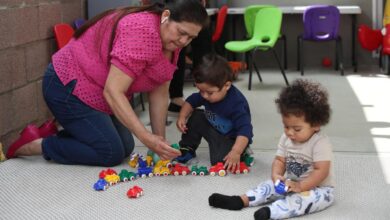
Play is more than just a way for children to pass the time; it’s a powerful mechanism through which they learn, explore, and develop foundational skills. In this exploration of serious playtime, we’ll delve into the significance of early childhood play and how it serves as a cornerstone for holistic development.
The Essence of Early Childhood Play
Play is a natural and instinctive behavior for children. It goes beyond mere entertainment; it’s a dynamic process that engages their minds, bodies, and emotions. Whether it’s building with blocks, engaging in imaginative role-play, or participating in group games, every play activity contributes to a child’s cognitive, social, emotional, and physical development.
Cognitive Development Through Play
Play serves as a cognitive workout for young minds. Activities like sorting, counting, and categorizing during play stimulate cognitive processes. Problem-solving games, puzzles, and creative play enhance critical thinking skills, laying the foundation for future academic success.
Social and Emotional Growth
Engaging in play with peers helps children develop essential social skills. They learn to share, take turns, negotiate, and communicate effectively. Imaginative play, where children create scenarios and take on roles, fosters empathy and emotional intelligence, contributing to the development of well-rounded individuals.
Physical Development and Motor Skills
Active play, both indoors and outdoors, is vital for the development of gross and fine motor skills. Running, jumping, climbing, and playing sports contribute to physical strength and coordination. Fine motor skills are honed through activities like drawing, painting, and building with small objects.
The Role of Play in Language Development
Play is a language-rich environment where children practice communication skills. Whether they’re engaged in pretend play, storytelling, or participating in group activities, language development is inherent to the play process. It enhances vocabulary, linguistic creativity, and the ability to express thoughts and feelings.
Creating the Optimal Play Environment
For serious playtime to thrive, providing a conducive environment is key. Here are essential elements to consider:
1. Diverse Play Materials: Offer a variety of play materials, including open-ended toys that encourage creativity and imagination.
2. Safe and Stimulating Spaces: Designate safe spaces for active play and ensure the play area is stimulating with colors, textures, and age-appropriate challenges.
3. Balance of Structured and Unstructured Play: Strike a balance between activities with specific goals and free-form play, allowing children to explore and create on their terms.
4. Encourage Outdoor Play: Outdoor play provides unique sensory experiences and promotes physical well-being. Ensure there’s access to nature and fresh air.
Parental Involvement in Play
Parents play a crucial role in facilitating serious playtime. Engage in play with your child, participate in their imaginative scenarios, and allow them to take the lead. This not only strengthens the parent-child bond but also enriches the play experience for the child.
Conclusion: Nurturing Through Play
Serious playtime is a powerful vehicle for early childhood development. As parents, educators, and caregivers, recognizing the multifaceted benefits of play allows us to create environments that support and enrich a child’s natural inclination to explore and learn through play. Embrace the joy, creativity, and boundless potential that serious playtime brings to the formative years of childhood.










